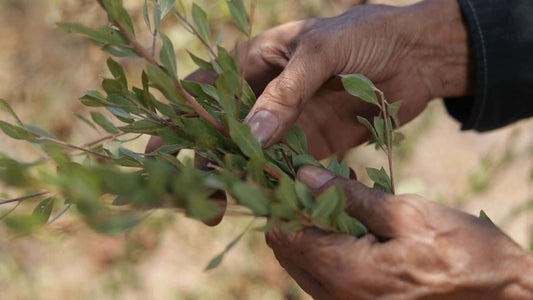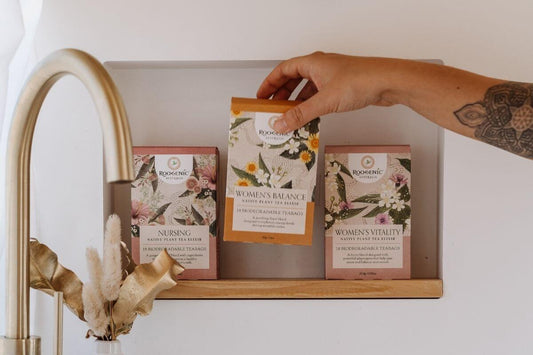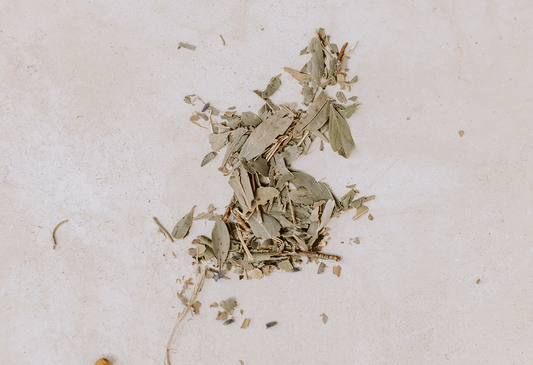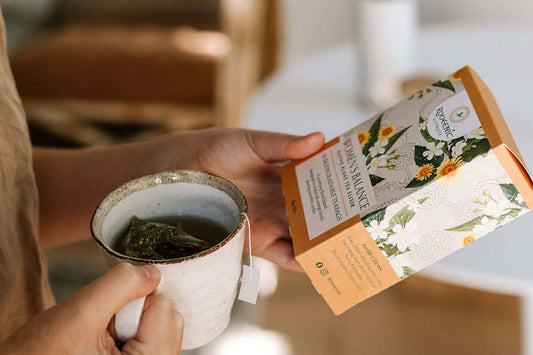Discover information about the power of Australian Native plants to create powerful remedies for sleep, gut health, metabolism, detoxification and more.

5 Plants to Boost Your Mood
If you’re anything like us, you try your best to eat healthily, sleep well and exercise enough to keep your body happy and balanced. But, given all of life’s challenges, even your best efforts won’t exempt you from the occasional moody day. And if you’re not mindful, your energy, mood and stress levels can become a vicious cycle of fatigue, irritability and overwhelm. Native Australian plants and other natural herbs can provide a gentle yet holisitic way to boost your mood and ease anxiety. As an added benefit, the ritual of brewing the plants as a tea or a herbal long infusion can serve as a meditative practice and a moment of self-care to help you destress further, unlocking a new level of calm. Here are 5 plants that can help boost your mood: 1. Wild Crafted Jilungin (Terminalia canescens) Jilungin is a native Australian plant that has been traditionally used by Indigenous Australians to ease stress, calm an overactive mind or improve overall well being. It is wild harvested by the Nyul Nyul community in the Dampier Peninsula region in Western Australia and can be enjoyed during the day or night to alleviate symptoms of anxiety. 2. Native Rosella (Hibiscus heterophyllus) Countless studies have now shown that there is a direct connection between gut health and symptoms of anxiety and depression. Incredibly, Hibiscus has been proven to be a rich source of polyphenols as based on evidence A, B and C and a source of antioxidants as based on evidence A, B and C, helping good gut bacteria thrive. Further, Hibiscus has also been shown to improve relaxation and sleep based on evidence A and B. 3. Aniseed Myrtle (Syzygium anisatum) Aniseed Myrtle has been used as a traditional remedy for stress relief by Indigenous Australians. The native plant has been used to slow neurotransmitters in the brain and create a sense of calm. It also contains lutein which recent studies have shown can help regulate the stress hormone, cortisol. 4. Ashwagandha Root (Withania somnifera) Ashwagandha Root is a powerful adaptogen that can help with vitality and creating calm by regulating the body’s response to stress. It has been proven to help reduce stress as based on evidence A, B and C, and improve mood by reducing anxiety and depression as based on evidence A, B and C. 5. Shatavari Root (Asparagus racemosus) Shatavari Root has been proven to help reduce stress (based on studies A and B) protect the brain against oxidative damage (based on studies A and B) and has an antidepressant action (based on studies A and B) Shop our teas for stress and mood
Read more5 Plants to Boost Your Mood
If you’re anything like us, you try your best to eat healthily, sleep well and exercise enough to keep your body happy and balanced. But, given all of life’s challenges, even your best efforts won’t exempt you from the occasional moody day. And if you’re not mindful, your energy, mood and stress levels can become a vicious cycle of fatigue, irritability and overwhelm. Native Australian plants and other natural herbs can provide a gentle yet holisitic way to boost your mood and ease anxiety. As an added benefit, the ritual of brewing the plants as a tea or a herbal long infusion can serve as a meditative practice and a moment of self-care to help you destress further, unlocking a new level of calm. Here are 5 plants that can help boost your mood: 1. Wild Crafted Jilungin (Terminalia canescens) Jilungin is a native Australian plant that has been traditionally used by Indigenous Australians to ease stress, calm an overactive mind or improve overall well being. It is wild harvested by the Nyul Nyul community in the Dampier Peninsula region in Western Australia and can be enjoyed during the day or night to alleviate symptoms of anxiety. 2. Native Rosella (Hibiscus heterophyllus) Countless studies have now shown that there is a direct connection between gut health and symptoms of anxiety and depression. Incredibly, Hibiscus has been proven to be a rich source of polyphenols as based on evidence A, B and C and a source of antioxidants as based on evidence A, B and C, helping good gut bacteria thrive. Further, Hibiscus has also been shown to improve relaxation and sleep based on evidence A and B. 3. Aniseed Myrtle (Syzygium anisatum) Aniseed Myrtle has been used as a traditional remedy for stress relief by Indigenous Australians. The native plant has been used to slow neurotransmitters in the brain and create a sense of calm. It also contains lutein which recent studies have shown can help regulate the stress hormone, cortisol. 4. Ashwagandha Root (Withania somnifera) Ashwagandha Root is a powerful adaptogen that can help with vitality and creating calm by regulating the body’s response to stress. It has been proven to help reduce stress as based on evidence A, B and C, and improve mood by reducing anxiety and depression as based on evidence A, B and C. 5. Shatavari Root (Asparagus racemosus) Shatavari Root has been proven to help reduce stress (based on studies A and B) protect the brain against oxidative damage (based on studies A and B) and has an antidepressant action (based on studies A and B) Shop our teas for stress and mood
Read more
How to Sleep Well with Anxiety
The last year has been stressful, unpredictable and anxiety-inducing for many people. There’s a complicated, unhealthy relationship between anxiety and sleep. Lack of sleep can increase your feelings of anxiety and stress, while anxiety and stress in turn can prevent you from getting to sleep and staying asleep. Anxiety occurs when the amygdala senses danger and it sends a neurological message to the prefrontal cortex, which responds by activating either your flight or fight response. Usually, the amygdala works appropriately and helps you to perceive real life danger, but for those who experience anxiety, very small stressors can provoke this function and you may find yourself running from your warm bed. To get to sleep your mind and body need to reach a relaxed state before you can snooze off. Anxiety causes a racing mind, tensed muscles, increased heart rate and body temperature, making it much more difficult to get a good night sleep. Here are seven tips to help you zen out and snooze your stresses away. 1. Create a bedtime ritual Doing the same thing every night before going to bed gives your mind and body the psychological clues it needs to begin winding down and ready itself for bed. By reading a book, listening to soft music, or having a warm bath every night before sleep, you’ll help your body and mind to unwind and promote an easier journey to sleep. 2. Set aside a worry time Dedicating an hour of the day to worry about the things that provoke your anxiety such as relationships, work, assignments, or bills, in a peaceful environment during the morning or afternoon will help you avoid restless nights of worry. This not only helps alleviate your anxiety during the night, but it also helps you react more rationally and critically as we tend to be more vulnerable and have less access to helpful resources during the late hours of the night. 3. Jot down your stresses If you’re finding that anxiety is stopping you from sleeping at night, it’s likely that you’re worrying about something. Writing down your stresses in a journal or diary can help to move them out of your mind, and onto paper instead of staying awake all night thinking about it and how to overcome it. 4. Exercise during the day Exercise is known to help ease anxiety, as your body produces endorphins or “happy hormones” during your workout. Additionally, it boosts your body’s production of the natural sleep hormone “melatonin” and supports a good night’s sleep. Remember not to work out up to three hours before bed as this will increase heart rate and reinforce mental and physical stimulation, affecting your ability to get to sleep. 5. Only go to bed when you’re sleepy Avoiding the bed when you’re feeling too anxious to sleep, or just can’t seem to keep your eyes closed until you’re naturally sleepy. If you can’t get to sleep after 30 minutes, get out and bed and try doing a relaxing activity like readying a book or enjoying a herbal tea, like our Native Relaxation Tea and Native Sleep Tea which have helped thousands of people reach a relaxed state of mind and experience a good nights sleep. A cup 20 minutes before bed can work wonders on your sleep pattern. 6. Stick to a sleeping schedule Going to sleep and waking up at the same time every day will reset your body clock and circadian rhythm. This will make your body and mind get naturally sleepy at the same time every day. When your body knows it’s time to sleep, you’ll find it much easier to wind down and have a snooze. 7. Have a herbal tea If you find yourself unable to de-stress and finally get to sleep, try relaxing with one of our herbal tea blends. Our Native Relaxation Tea and Native Sleep Tea contain natural, native plants that are known to ease anxiety and support a deep, high quality sleep, such as the native super-plant Jilungin. We’ve officially received over 1,400 five-star reviews from customers struggling to get to sleep, not to mention our Native Relaxation Tea winning first place at the Golden Leaf Tea awards for “most functional herbal sleep tea”. Shop Sleep BundleShop All Sleep Products
Read moreHow to Sleep Well with Anxiety
The last year has been stressful, unpredictable and anxiety-inducing for many people. There’s a complicated, unhealthy relationship between anxiety and sleep. Lack of sleep can increase your feelings of anxiety and stress, while anxiety and stress in turn can prevent you from getting to sleep and staying asleep. Anxiety occurs when the amygdala senses danger and it sends a neurological message to the prefrontal cortex, which responds by activating either your flight or fight response. Usually, the amygdala works appropriately and helps you to perceive real life danger, but for those who experience anxiety, very small stressors can provoke this function and you may find yourself running from your warm bed. To get to sleep your mind and body need to reach a relaxed state before you can snooze off. Anxiety causes a racing mind, tensed muscles, increased heart rate and body temperature, making it much more difficult to get a good night sleep. Here are seven tips to help you zen out and snooze your stresses away. 1. Create a bedtime ritual Doing the same thing every night before going to bed gives your mind and body the psychological clues it needs to begin winding down and ready itself for bed. By reading a book, listening to soft music, or having a warm bath every night before sleep, you’ll help your body and mind to unwind and promote an easier journey to sleep. 2. Set aside a worry time Dedicating an hour of the day to worry about the things that provoke your anxiety such as relationships, work, assignments, or bills, in a peaceful environment during the morning or afternoon will help you avoid restless nights of worry. This not only helps alleviate your anxiety during the night, but it also helps you react more rationally and critically as we tend to be more vulnerable and have less access to helpful resources during the late hours of the night. 3. Jot down your stresses If you’re finding that anxiety is stopping you from sleeping at night, it’s likely that you’re worrying about something. Writing down your stresses in a journal or diary can help to move them out of your mind, and onto paper instead of staying awake all night thinking about it and how to overcome it. 4. Exercise during the day Exercise is known to help ease anxiety, as your body produces endorphins or “happy hormones” during your workout. Additionally, it boosts your body’s production of the natural sleep hormone “melatonin” and supports a good night’s sleep. Remember not to work out up to three hours before bed as this will increase heart rate and reinforce mental and physical stimulation, affecting your ability to get to sleep. 5. Only go to bed when you’re sleepy Avoiding the bed when you’re feeling too anxious to sleep, or just can’t seem to keep your eyes closed until you’re naturally sleepy. If you can’t get to sleep after 30 minutes, get out and bed and try doing a relaxing activity like readying a book or enjoying a herbal tea, like our Native Relaxation Tea and Native Sleep Tea which have helped thousands of people reach a relaxed state of mind and experience a good nights sleep. A cup 20 minutes before bed can work wonders on your sleep pattern. 6. Stick to a sleeping schedule Going to sleep and waking up at the same time every day will reset your body clock and circadian rhythm. This will make your body and mind get naturally sleepy at the same time every day. When your body knows it’s time to sleep, you’ll find it much easier to wind down and have a snooze. 7. Have a herbal tea If you find yourself unable to de-stress and finally get to sleep, try relaxing with one of our herbal tea blends. Our Native Relaxation Tea and Native Sleep Tea contain natural, native plants that are known to ease anxiety and support a deep, high quality sleep, such as the native super-plant Jilungin. We’ve officially received over 1,400 five-star reviews from customers struggling to get to sleep, not to mention our Native Relaxation Tea winning first place at the Golden Leaf Tea awards for “most functional herbal sleep tea”. Shop Sleep BundleShop All Sleep Products
Read more
Australian Superfoods for New and Expecting Mums
When you’re pregnant or nursing, you’ll likely find yourself on a daily Google for “safe foods” for you and your growing baby. And let’s face it — it’d save you a lot of energy if those safe foods also helped keep your digestion balanced, skin nourished, and energy levels high! At Roogenic, we’re always on the search for powerhouse native ingredients that can support your health and wellbeing naturally through every stage of life. So, we’ve rounded up the best Australian native superfoods to help you maintain your maternal glow. QUANDONG The Quandong, a deliciously sweet and tart fruit, is a sustainable source of micronutrients known to nourish expecting or nursing mothers. The fruit is a powerful source of essential micronutrients for mums as their bodies adjust to growing, healing and nourishing their new babies. Rich in magnesium and zinc to support immunity, healing and metabolism (see study) Fortifies the body with iron to combat fatigue (see study) Higher antioxidant content to that of a blueberries “outstanding antioxidant capacity” (see study) Nourishing to the skin with high Vitamin E content (higher than in an avocado!) (see study) You’ll find Quandong in our new Pregnancy and Nursing Tea, naturopathically accredited to support expecting and nursing mothers. Buy Pregnancy & Nursing Tea LEMON MYRTLE Lemon Myrtle is a powerful citrus herb that offers an exceptionally sweet, lemony flavour. Traditionally used as a topical treatment, Aboriginal Australians would grind the fresh leaves into a paste and apply topically to wounds. Superior antioxidant and lutein content to defend the body against free radicals and support a healthy baby (see study). Vegan source of calcium (see study) Aids digestion with it’s antimicrobial properties. You’ll find Lemon Myrtle in our new Women's Wellness Range, naturopathically accredited to support women in all stages of life. Shop Women's Wellness Range STRAWBERRY GUM Traditionally used by Indigenous Australians as bush medicine to ease an upset stomach, this unique bush plant also plays an incredible role in enhancing a rich berry flavour Packed with antioxidants (research) (see study) Helps to balance the micro flora of the gut (see study) Anti-fungal and antibiotic properties (see study) Flavour profile: passion fruit + strawberry You’ll find Strawberry Gum in our new Nursing Tea, naturopathically accredited to support nursing mothers. Buy Nursing Tea
Read moreAustralian Superfoods for New and Expecting Mums
When you’re pregnant or nursing, you’ll likely find yourself on a daily Google for “safe foods” for you and your growing baby. And let’s face it — it’d save you a lot of energy if those safe foods also helped keep your digestion balanced, skin nourished, and energy levels high! At Roogenic, we’re always on the search for powerhouse native ingredients that can support your health and wellbeing naturally through every stage of life. So, we’ve rounded up the best Australian native superfoods to help you maintain your maternal glow. QUANDONG The Quandong, a deliciously sweet and tart fruit, is a sustainable source of micronutrients known to nourish expecting or nursing mothers. The fruit is a powerful source of essential micronutrients for mums as their bodies adjust to growing, healing and nourishing their new babies. Rich in magnesium and zinc to support immunity, healing and metabolism (see study) Fortifies the body with iron to combat fatigue (see study) Higher antioxidant content to that of a blueberries “outstanding antioxidant capacity” (see study) Nourishing to the skin with high Vitamin E content (higher than in an avocado!) (see study) You’ll find Quandong in our new Pregnancy and Nursing Tea, naturopathically accredited to support expecting and nursing mothers. Buy Pregnancy & Nursing Tea LEMON MYRTLE Lemon Myrtle is a powerful citrus herb that offers an exceptionally sweet, lemony flavour. Traditionally used as a topical treatment, Aboriginal Australians would grind the fresh leaves into a paste and apply topically to wounds. Superior antioxidant and lutein content to defend the body against free radicals and support a healthy baby (see study). Vegan source of calcium (see study) Aids digestion with it’s antimicrobial properties. You’ll find Lemon Myrtle in our new Women's Wellness Range, naturopathically accredited to support women in all stages of life. Shop Women's Wellness Range STRAWBERRY GUM Traditionally used by Indigenous Australians as bush medicine to ease an upset stomach, this unique bush plant also plays an incredible role in enhancing a rich berry flavour Packed with antioxidants (research) (see study) Helps to balance the micro flora of the gut (see study) Anti-fungal and antibiotic properties (see study) Flavour profile: passion fruit + strawberry You’ll find Strawberry Gum in our new Nursing Tea, naturopathically accredited to support nursing mothers. Buy Nursing Tea
Read more
Let’s Support Indigenous Communities By Improvi...
A few weeks back, we were invited to participate in a summit hosted by Queensland University, where we discussed ways to improve wild harvesting practices in Australia. Queensland University is currently conducting a lot of nutritional research on the benefits of bush tucker, while also looking at ways to improve crop size for these Indigenous communities.The ongoing goal of the intimate summit was to increase the processes and awareness surrounding wild harvesting. This way, larger amounts of native fruits can be harvested to develop a greater working ecosystem for Aboriginal families and communities. This topic is very close to our hearts. We source most of our plants from Indigenous communities and we’ve received tremendous support from them and their Elders, who have generously shared their knowledge with us. It’s therefore part of our mission to let people know how important wild harvesting is.Indigenous communities depend on wild harvesting to survive. It’s impossible for them to compete with the commercialisation and large-scale production of bush tucker. We want to protect these remote communities and their livelihood so that they can thrive and continue to take care of the land.No one can do this better, because traditional wisdom is at the core of caring for Australian land. Indigenous growers know exactly how to groom the trees and take care of the precious native plants our country has to offer, in a perfectly natural way. They take what they need to sell, always making sure the natural balance of the ecosystem is not affected. Wild harvesting represents… … a pillar of employment for Indigenous people… a promise of ecological sustainability and care… a way to allow Indigenous wisdom to be passed through generations. Elders employ young Indigenous Australians, share their knowledge and tell their stories.We’ll continue to do our part in the development of wild harvesting and work with the growing number of institutions that share similar goals.We also wanted to express our gratitude to Elder Bruno Dann from Twin Lakes Cultural Parkland, Elder David Hewitt from Wild Orchard Kakadu Plum, and Michelle from Kiril Park Wild Harvest for paving the road in this industry. We will do everything possible as suppliers to ensure they continue to succeed.
Read moreLet’s Support Indigenous Communities By Improvi...
A few weeks back, we were invited to participate in a summit hosted by Queensland University, where we discussed ways to improve wild harvesting practices in Australia. Queensland University is currently conducting a lot of nutritional research on the benefits of bush tucker, while also looking at ways to improve crop size for these Indigenous communities.The ongoing goal of the intimate summit was to increase the processes and awareness surrounding wild harvesting. This way, larger amounts of native fruits can be harvested to develop a greater working ecosystem for Aboriginal families and communities. This topic is very close to our hearts. We source most of our plants from Indigenous communities and we’ve received tremendous support from them and their Elders, who have generously shared their knowledge with us. It’s therefore part of our mission to let people know how important wild harvesting is.Indigenous communities depend on wild harvesting to survive. It’s impossible for them to compete with the commercialisation and large-scale production of bush tucker. We want to protect these remote communities and their livelihood so that they can thrive and continue to take care of the land.No one can do this better, because traditional wisdom is at the core of caring for Australian land. Indigenous growers know exactly how to groom the trees and take care of the precious native plants our country has to offer, in a perfectly natural way. They take what they need to sell, always making sure the natural balance of the ecosystem is not affected. Wild harvesting represents… … a pillar of employment for Indigenous people… a promise of ecological sustainability and care… a way to allow Indigenous wisdom to be passed through generations. Elders employ young Indigenous Australians, share their knowledge and tell their stories.We’ll continue to do our part in the development of wild harvesting and work with the growing number of institutions that share similar goals.We also wanted to express our gratitude to Elder Bruno Dann from Twin Lakes Cultural Parkland, Elder David Hewitt from Wild Orchard Kakadu Plum, and Michelle from Kiril Park Wild Harvest for paving the road in this industry. We will do everything possible as suppliers to ensure they continue to succeed.
Read more
Product Highlight: Roogenic Women’s Balance, th...
Do you get really tired during your period? You’re not alone. Many women experience fatigue and a slew of unwanted symptoms that can put a damper on their day during that time of the month. While it might be tempting to crawl back into bed, binge eat your favourite snacks and watch some Netflix, that’s probably not the best way to tackle PMS fatigue. Instead, let’s look at why you feel so drained during your period and how you can get back on track and feel amazing, just by drinking a cup of Women’s Balance. This special combination of herbs can help with fatigue You might be wondering what the deal is with your energy levels when you’re getting closer to your period. All the unpleasant symptoms you experience as PMS are caused by the rapid rise and fall of estrogen levels. This leads to feeling sluggish and carries on during your menstruation.Iron also tends to go down during that time of the month, giving you a feeling of weakness and altering your mood (aka you feel downright miserable/irritable). So what can you do about it? We recommend trying to alleviate your symptoms the natural way. Herbs are one of the most widely used natural remedies to fight PMS fatigue and replenish energy levels, with a few special plants even being linked to reduced pain and discomfort. In our Women’s Balance tea, we’ve gathered an entire collection of healing plants that have been associated with reduced symptoms during monthly cycles: Raspberry leaf has been shown to help regulate hormones such as oestrogen and testosterone (based on evidence A, B and C) and is a potent antioxidant (based on evidence A, B and C) Nettle leaf has been proven to reduce inflammation (based on evidence A, B and C) and is hormone balancing (based on evidence A, B, C and D) Fennel seeds have been proven to modulate hormones such as oestrogen and testosterone (based on evidence A, B and C) reduce painful periods (as seen in evidence A, B and C) and reduce adverse menopausal symptoms (based on evidence A, B and C) Goji berries have been proven to help with anxiety and stress (based on evidence A, B, C and D) and are a potent antioxidant (based on evidence A, B, C and D) Women’s Balance is one of those teas every woman needs in her home. It’s great during that time of the month and it can also improve overall wellbeing when drank on a daily basis. Not to mention it’s also delicious - you’ll love the floral flavour with playful fruity notes. Buy Women's Balance
Read moreProduct Highlight: Roogenic Women’s Balance, th...
Do you get really tired during your period? You’re not alone. Many women experience fatigue and a slew of unwanted symptoms that can put a damper on their day during that time of the month. While it might be tempting to crawl back into bed, binge eat your favourite snacks and watch some Netflix, that’s probably not the best way to tackle PMS fatigue. Instead, let’s look at why you feel so drained during your period and how you can get back on track and feel amazing, just by drinking a cup of Women’s Balance. This special combination of herbs can help with fatigue You might be wondering what the deal is with your energy levels when you’re getting closer to your period. All the unpleasant symptoms you experience as PMS are caused by the rapid rise and fall of estrogen levels. This leads to feeling sluggish and carries on during your menstruation.Iron also tends to go down during that time of the month, giving you a feeling of weakness and altering your mood (aka you feel downright miserable/irritable). So what can you do about it? We recommend trying to alleviate your symptoms the natural way. Herbs are one of the most widely used natural remedies to fight PMS fatigue and replenish energy levels, with a few special plants even being linked to reduced pain and discomfort. In our Women’s Balance tea, we’ve gathered an entire collection of healing plants that have been associated with reduced symptoms during monthly cycles: Raspberry leaf has been shown to help regulate hormones such as oestrogen and testosterone (based on evidence A, B and C) and is a potent antioxidant (based on evidence A, B and C) Nettle leaf has been proven to reduce inflammation (based on evidence A, B and C) and is hormone balancing (based on evidence A, B, C and D) Fennel seeds have been proven to modulate hormones such as oestrogen and testosterone (based on evidence A, B and C) reduce painful periods (as seen in evidence A, B and C) and reduce adverse menopausal symptoms (based on evidence A, B and C) Goji berries have been proven to help with anxiety and stress (based on evidence A, B, C and D) and are a potent antioxidant (based on evidence A, B, C and D) Women’s Balance is one of those teas every woman needs in her home. It’s great during that time of the month and it can also improve overall wellbeing when drank on a daily basis. Not to mention it’s also delicious - you’ll love the floral flavour with playful fruity notes. Buy Women's Balance
Read more